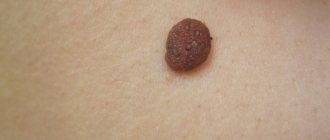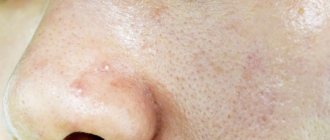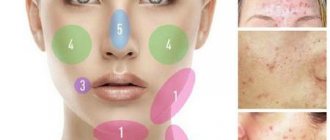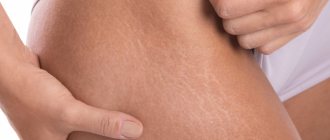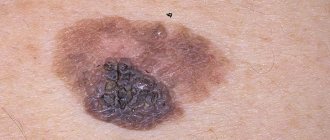From this article you will learn:
- What moles on the face “say”
- Why do they appear
- When is it necessary to remove moles on the face?
- What are the methods for removing moles?
- Why is it best to choose laser removal?
- Where are moles on the face removed in Moscow and how much does it cost?
The body of any person is distinguished by certain “marks”, which are known in everyday speech as moles, and in medicine they are called “nevi”. As a rule, a mole does not bother a person, but there are situations when it still needs to be removed. Such cases include situations when, for example, a mole is on the face, which, firstly, does not add an aesthetic component to the face, and, secondly, increases the risk of accidental skin injuries while washing or wiping with a towel.
What moles on the face “say”
Since the time of the Inquisition, moles, age spots or birthmarks on a person’s body or face have been interpreted as symbolic. In this case (during the period of the Inquisition) they were regarded as marks of the devil or mystical signs, especially regarding formations on the face or hands. It was believed that Satan himself thus marks those whom he has chosen for his service. Most often, women suffered from this: if there was a mole on her body, and even more so, its location was on her face, then the woman most likely ended up in an Inquisition trial, where her guilt was determined, and the trial was followed by burning at the stake.
But already in the 18th century, the idea of moles and people with moles changed dramatically. This was due to the legend that existed at that time that the face of the goddess of love and beauty Venus was decorated with a mole. Therefore, a mole, and even on the face, was considered a sign of the patronage of Venus, and women of different classes and ages introduced the fashion for so-called flies, usually moles drawn above the lip (as it was believed - for good luck).
Recommended articles on the topic:
- Painless lip modeling: techniques and recommendations
- Beauty injections: types, preparations, reviews
- Eyelash restoration at home and in a beauty salon
Today, when many signs and prevailing opinions are a thing of the past, attitudes towards moles have been revised again. In the modern world, many people are indifferent to them, although various fortune tellers also endow them with sacred meaning and try to determine fate by the moles a person has. There are many articles that describe the meaning of moles based on their location on the body. However, there is no unambiguous assessment of this theory: there are those who unconditionally believe in it, and those to whom this whole version seems unrealistic, illogical and absurd.
We will still try to correlate a person’s moles with his possible fate and future.
There are different approaches to examining moles on the human body and face. One of the most popular is to look at the shape of the mole and its size. It is believed that if a mole is round in shape, it will bring goodness to its owner. A more elongated and oblong mole is a sign of good luck, but a sharp mole symbolizes the uncertainty of life.
If a mole is on the face, namely on the left eyebrow, this may indicate a late marriage, while a mole on the right eyebrow, on the contrary, means an early marriage.
If a mole is located in the area of the lips or directly on the lip, then it is believed that its owner will be endowed with great love, real feelings and generally marked with the sign of Venus, but at the same time, the character of such a person may be distinguished by hypocrisy, some superficiality or frivolity, and also fear loneliness. The same mole can have another interpretation - it can distinguish a person who is cheerful, kind and open to the world.
As soon as you have a mole on your right cheek, stormy love experiences will soon begin in your life, and if on your left, then you will probably soon encounter troubles and troubles.
A mole on the nose symbolizes success in everything and is considered a sign of incredible luck.
A mole located in the corner of the eye is found in a person with a calm and measured character.
We can conclude that the face is the place on which a mole is always a symbol or sign of some qualities or signs. And if you are planning to remove a mole, then you should first look at what it symbolizes. Perhaps this is a mole of total luck, wealth and prosperity, or the best health, and it is no coincidence that it appeared on your body.
Read material on the topic: Laser facial skin rejuvenation: useful tips and recommendations
Why moles appear on the face
There are several groups of moles based on the characteristics of their internal structure, appearance or size. Moles are distinguished:
- Large, the size of which is more than 10 cm;
- Medium from one and a half to 10 cm;
- Small - from 0.5 mm to one and a half cm.
Small moles, as a rule, are absolutely harmless to the body, but large and medium ones can be quite dangerous, since there is always a risk that a mole or birthmark may develop into a malignant tumor. According to statistics, about 30% of cases end this way, especially if there are other unfavorable factors: taking certain (certain) medications, poor lifestyle or prolonged exposure to the open sun under direct sunlight. Therefore, removing a large mole on the face is a necessity.
In most cases, moles appear almost immediately after the baby is born. Usually, by the age of 8, moles are already fully formed, and at a later age they can only change slightly in size. But sometimes it happens that a mole appears in adulthood. This occurs due to the concentration of pigment cells in certain layers of the skin. Such moles are divided into the following groups:
- Intradermal formed inside the dermal layer of the skin;
- Epidermal are located in the middle layer of the skin;
- Mixed - moles located on the border of the dermis and epidermis.
Mixed moles are usually flat, while intradermal and epidermal moles look like small peas.
Why do newly acquired nevi appear?
- Due to any hormonal imbalances in the body;
- During certain periods of life, the human body is most predisposed to the formation of moles (puberty, pregnancy, lactation, transition to adulthood - after 50 years, nevi often appear on the face and neck, etc.);
- The effect of the sun on the skin (including the effect of solarium lamps);
- Prolonged treatment with drugs or hormonal drugs;
- Frequent massage.
Classification
Moles on the lip are divided into two groups.
- Pigmented. Consist of cells containing melanin. They range in color from beige to black. They are flat and convex. They usually appear near the corners of the lips: above or below. They have a high risk of malignancy - degeneration into melanoma.
- Vascular. They are called hemangiomas. They are flat spots. They are formed due to excessive growth of capillaries and disruption of the integrity of blood vessels. There are different shades of red. Localized on the surface of the lips. When pressed, the hemangioma turns pale and after some time returns to its original color. It never transforms into cancer.
When is it necessary to remove moles and warts on the face?
The appearance of nevi on the face is not an indicator of illness; perhaps it is simply a protective reaction of the body to specific life factors or conditions. However, you should start to worry or think about removing them if moles begin to appear quickly or if several of them appear at once. In such cases, large moles on the face should be removed 100% (especially if they have begun to grow). If you notice such a process, then you need to contact a specialist, for example, a dermatologist, as soon as possible. But we would recommend contacting an oncologist to be on the safe side, because the risk of a mole turning into a tumor still exists. However, if you detect this in the early stages, carry out timely diagnosis and consult a doctor, you can prevent sad consequences. And even if this problem seems far-fetched to you, it is better to consult a doctor. If you choose to remove a mole on your face, the worst-case scenario may be leftover scars or scars. But if you decide to leave everything as it is, then the consequences can be much worse and more dangerous.
At your appointment, you need to discuss in detail all the symptoms and signs that cause you discomfort due to the presence of moles. There can be very, very many examples. For example, a mole:
- Grows/changes shape;
- Changes color or external “texture”;
- Itches/flakes/hurts.
Any of the above signs (or any others that concern you) may be reason to contact a professional for information on how to remove it. Even a standard consultation should be carried out by an experienced doctor, since an ordinary mole can become a problem.
The doctor will perform the following actions: examine the site of the nevus, maybe take a skin scraping, give a referral for tests and send you home until the test results are received. After this, a second appointment should take place, at which the doctor will explain the appearance of neoplasms, describe the degree of danger of your moles, give advice on taking preventive measures, and also advise on the possibility of removing a mole from the face and recommend places for this procedure. Surgery to remove a mole on the face is not a scary procedure at all.
Read material on the topic: Facial mesotherapy procedure: pros and cons
Which methods of removing moles on the face are good and which are not?
Today there are many different methods for removing moles:
- Surgical;
- Cryodestruction (removal of moles with nitrogen);
- Electrocoagulation;
- Application of CO2 laser.
It is necessary to choose the right treatment method to achieve maximum effect.
Removing moles on the face with laser
Taking into account the fact that there are a huge number of methods for combating moles, one of the most productive is laser removal of a mole on the face, since it is this method that allows you to regulate the depth of laser exposure and ensure maximum precision with minimal damage to surrounding tissues. Moreover, we are talking about removing nevi specifically on the face or other open surfaces of the body.
Laser removal requires local anesthesia. The action of a high-precision laser beam is aimed at gradually removing the surface of the mole layer by layer.
Laser surgery to remove a mole (especially on the face) has many advantages over other types of removal:
- One hundred percent guarantee of mole removal after the 1st procedure;
- No bleeding;
- Rapid wound healing – a maximum of a week;
- Almost complete absence of subsequent complications, such as scars after removal of moles on the face, scars, pigmentation.
Another advantage of laser mole removal is its painlessness and very short operation time (only a few minutes).
After removing a mole, however, you must follow a few fairly simple rules:
- Try to avoid the influence of high and low temperatures on the skin, contact with direct sunlight.
- To dry the skin of the treated surface areas, you need to blot them rather than wipe them;
- For 2 weeks, forget about saunas/solariums/swimming pools/sunbathing. If you need to go outside, you need to apply sunscreen with a factor of at least 35 SPF (if we are talking about the face, then this is a mandatory condition);
- Use only alcohol-free products to care for the face and treated skin area in the next three days after surgery.
After removing a mole with a laser, a small dried crust will appear that does not need to be peeled off - it will fall off on its own in the next seven days. When the healing process comes to an end, there will be no scars or any other marks left in this place, as well as other consequences. Laser mole removal is one of the safest procedures if performed by a competent specialist.
Surgical removal of a mole on the face
This method is most often used to remove large and deep tumors. Anesthesia is required for its implementation. After the operation, sutures are placed at the removal site, which must be removed after five days. This method leaves behind scars, which over time take the form of barely noticeable white scars, so it is practically not used to remove moles on the face.
For this operation, the risk of bleeding and infection is quite high.
Cryodestruction
Cryodestruction is the process of freezing a nevus with liquid nitrogen (temperatures up to -180 degrees).
This method is also not used to remove moles on the face, because it is quite specific: the tissue that has died during the procedure is not eliminated, but remains in place, forming a kind of protective film. Healthy skin begins to form underneath, but this is a rather lengthy process - healing after removal can take twice as long as when using a laser.
However, this method also has its immediate advantages:
- The mole disappears absolutely without a trace, and 100% there will be no scars on the face;
- The recovery process is painless.
- Antiseptic effect.
The disadvantages of this method are that it is not always possible to remove a mole at once (sometimes it is necessary to perform another procedure). Also, the area of nitrogen exposure cannot always be precisely limited, and this can lead to damage to surrounding healthy tissue. Plus, there is a possibility of getting a burn, which can slow down the already slow process of facial skin restoration.
Electrocoagulation for mole removal
Removal of moles by electrocoagulation can be performed on any area of the skin, including the face. This is the removal of moles using an electric current pulse that burns the mole from the skin.
The advantages of this method are that:
- The mole is removed in one session;
- The procedure is suitable for all types of moles and for all areas of the skin;
- No blood;
- High speed.
Disadvantages: after removing a mole using this method, a scar may remain (although it is usually barely noticeable, but on the face this is usually critical).
Read material on the topic: Plasmolifting of the face - a breakthrough in domestic cosmetology
Radio wave destruction
The most modern and advanced method of removing skin tumors is radio wave destruction.
Contrary to fashionable consumer demand for laser removal, it is the radio knife that gives the optimal result. This unique non-contact method of skin incision and coagulation using the SURGITRON radio wave surgical generator has proven itself excellently all over the world.
The essence of the method is that the energy of high frequency radio waves (3.8-4.0 MHz) is concentrated at the tip of the thinnest working electrode. Its powerful flow, directed at the object being removed, causes a surge of intracellular molecular energy, which increases the temperature and actually evaporates the cells. In this case, there is no direct contact of the electrode with the skin. The doctor, having set the parameters necessary for a specific manipulation (wave shape and power), completely controls the depth and area of influence and removes the pathological skin tumor as carefully as possible, literally with pinpoint precision.
What is extremely important: this method
removal
allows you to remove the skin neoplasm entirely
and
the resulting biopsy specimen for histological examination
. Histological examination must be carried out both in accordance with the requirements of the Ministry of Health and in order to identify possible malignant transformation of the tumor and prevent the development of skin cancer. Unlike radioknife, when removing with any laser, liquid nitrogen and chemical acid, it is impossible to obtain a biopsy specimen and perform a histological examination.
Contraindications to the tumor removal procedure are:
- Pulmonary heart failure in the stage of decompensation;
- Acute infectious diseases;
- Feverish state;
- Chronic hepatitis in the stage of decompensation;
- Diabetes mellitus in the stage of decompensation;
- The patient has a pacemaker and epilepsy.
Dermatoscopy of moles
The main diagnostic measure is dermatoscopy.
Dermatoscopy is a visual examination of the skin performed by dermatologists.
Diagnostics is of great importance for the prevention and early diagnosis of skin cancer.
The study uses a device known as a dermatoscope.
This is a small instrument that can magnify the area of skin being examined.
The device also has a light source.
There are many types of dermatoscopes.
In simpler models, the diagnostician looks directly into the magnifying glass.
If the device model is more modern, the dermatoscope can be connected to a computer.
This will allow you to enlarge the image the required number of times.
The image can be downloaded and saved on your computer for later use or for sending to other healthcare professionals.
Dermatoscopy is a non-invasive imaging technique.
Allows you to see submicroscopic structures invisible to the naked eye.
Diagnostics is used to study pigmented and amelanotic skin lesions.
Dermatoscopy is also called epiluminescence microscopy, incident light microscopy, and skin surface microscopy.
It is the most commonly used imaging method in dermatological practice.
What care is needed after removing a mole on the face?
Whatever method of removing moles on the face you choose, you need to pay close attention to the postoperative period, because failure to follow the doctor’s instructions or failure to comply with basic hygiene rules can cause the formation of spots and scars even after the most successful operations. There are a number of restrictions that must be observed. When a mole on the face is removed, after surgery in the first week you cannot:
- Wet the resulting crust with water.
- Expose your facial skin to direct sunlight.
- Use skin care cosmetics on the area of facial skin that was exposed to laser or electric current.
Failure to comply with these rules is critical. The area where the mole was removed must be treated, for example, with brilliant green or potassium permanganate, unless the doctor has prescribed the use of special drugs. If you choose between brilliant green and potassium permanganate, then it is better to use potassium permanganate, since it does not leave bright marks on the skin of the face.
To make a solution, just add potassium permanganate to a glass of water on the tip of a knife, then apply the solution to sterile cotton wool and blot the crust every two hours (for a few seconds). You can continue such manipulations for a week to maintain and consolidate the effect. And at the same time, you need to minimize the amount of time outside, but if you still absolutely need to go out into the fresh air, then you must definitely apply SPF cream to your facial skin.
“Will you take a test from the mole the day before?”
The only analysis that can reliably determine the nature of the formation is histological examination. The formation is removed entirely and sent for pathomorphological examination. No “plucking” is performed in advance before removing moles.
It is possible to perform a cytological examination in advance if there is discharge, ulceration or trauma to the formation. This study allows you to establish a preliminary diagnosis and is performed when it is difficult to make a preliminary diagnosis. Often, an external examination or dermatoscopy is sufficient to make a diagnosis. For example, in relation to fibroepithelial polyps (papillomas), keratomas, fibromas, viral warts, a fairly large group of nevi (intradermal, warty, non-pigmented, etc.).
Removing moles on the face: patient reviews
Read material on the topic: How to remove wrinkles on the face: the most effective methods
Removal of moles on the face in Moscow
To remove a mole in Moscow, we recommend contacting the Veronika Herba City Health and Beauty Center. Our clinic has a number of advantages:
- Modern equipment.
To carry out measures to remove moles, we use the method of radio wave destruction using the SURGITRON generator, which allows us to reduce the operation time to 20-30 minutes. The procedure takes place in a modernly equipped operating room that meets approved standards.
- Qualified specialists.
Due to the fact that our center has existed for 18 years, our experienced dermatologists have performed more than 1000 successful operations and gained enormous experience in removing skin tumors.
- Removing moles without pain
, since local anesthesia is selected individually for each of our clients.
- Before performing the operation, we We carry out a full examination
, the purpose of which is to make sure that the mole is not a malignant neoplasm.
- Transparency of work
. Your doctor will tell you about all the stages of the operation to remove a mole and post-operative prevention, as well as what parameters determine the price.
- Saving time .
We have an individual approach to each client, so the time of the procedure will be agreed upon taking into account your wishes and plans.
You don't have to spend a lot of time performing complex and unpleasant procedures at home. It is much easier to seek help from real professionals - the Veronika Herba beauty and health center, equipped with effective and modern equipment. There are two such centers in Moscow – near Timiryazevskaya metro station and Otradnoye metro station.
Why clients choose Veronika Herba Beauty and Health Center:
- This is a beauty center where you can take care of yourself at a reasonable cost, while your face and/or body will be treated not by an ordinary cosmetologist, but by one of the best dermatologists in Moscow. This is a completely different, higher level of service!
- You can receive qualified help at any time convenient for you. The beauty center is open from 9:00 to 21:00, seven days a week. The main thing is to agree with your doctor in advance on the date and time of your appointment.
Sign up for a consultation with a specialist by phone +7 (495) 085-15-13
, and you will see for yourself!
“Should I remove moles or not?”
There are formations on the skin that need to be removed because there is a high risk of cancer.
Mostly such formations are excised with mandatory histological examination of the surgical material. Benign, non-precancerous skin formations must be removed for cosmetic reasons, in case of unpleasant sensations (trauma, itching), if permanent damage to the formation or other discomfort occurs.
In any case, you should consult a dermatologist or oncologist about whether moles need to be removed. He should also recommend the optimal removal method.



